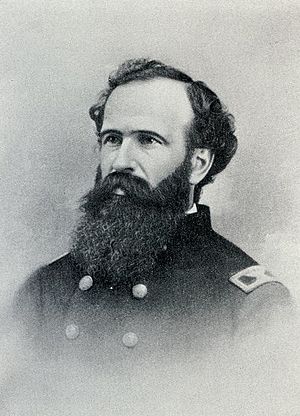Benjamin F. Fisher facts for kids
Quick facts for kids
Chief Signal Officer, U.S. Army
Benjamin Franklin Fisher
|
|
|---|---|
 |
|
| Born | November 21, 1834 Spring Mills, Pennsylvania, United States |
| Died | September 9, 1915 (aged 80) Schuylkill, Pennsylvania, United States |
| Allegiance | |
| Branch | |
| Years of service | 1861 – 1867 |
| Rank | |
| Unit | 3rd Pennsylvania Reserve Regiment |
| Battles/wars | American Civil War
|
| Alma mater | Franklin & Marshall College |
Benjamin Franklin Fisher was an important American soldier during the American Civil War. He became a high-ranking officer, a Brevet Brigadier General. He was also the Chief Signal Officer for the Army of the Potomac. This army played a big part in the Siege of Petersburg. Fisher is also famous for escaping from the difficult Libby Prison.
Contents
Biography
Early Life and Career
Benjamin Fisher was born on November 21, 1834, in Spring Mills, Pennsylvania. His father was Reverend Peter A. Fisher. Benjamin went to Franklin & Marshall College. Before the American Civil War started, he worked as a lawyer in Bucks County, Pennsylvania.
Serving in the Civil War
When the war began, Fisher joined the Union Army in July 1861. He started as a 1st Lieutenant in the 3rd Pennsylvania Reserve Regiment. Later, he was moved to the Signal Corps. He was promoted to Captain on July 7, 1862.
Fisher took part in the Peninsula Campaign with General Joseph Hooker. He also served as an observer during the Maryland campaign. In June 1863, he became a Chief Signal Officer.
He played a key role in the Battle of Chancellorsville. Fisher was praised for his leadership during this battle. He was one of the first officers to report General Robert E. Lee's army movements. This information was sent back to his home state of Pennsylvania.
After the battle, Fisher left his headquarters to report to General Alfred Pleasonton. On his way, he was captured by soldiers led by John S. Mosby. Fisher was then held as a prisoner of war at Libby Prison.
The Great Prison Escape
While in prison, Fisher became friends with Colonel Thomas E. Rose. Rose organized a group of prisoners to plan an escape. One night, around ten o'clock, Fisher and his group crossed the Chickahominy River. They managed to pass a guard at Meadow bridge.
The next day, they hid in a pine forest several miles beyond the river. They traveled only at night, avoiding roads. During the day, they hid in thick forests and swamps. When they got close to the White House, a big snowstorm hit. This forced Fisher and his group to hide for two days. They needed to avoid Confederate soldiers who were actively searching for them.
On the evening of February 18, Fisher's group was found by a Confederate search party. A fight broke out. Fisher managed to escape through the thickets and swamps. He arrived in Williamsburg, Virginia, on February 21, with some other escapees. Soon after, General Benjamin Butler's cavalry rescued them.
For his bravery during the escape, Fisher was promoted to Major in the Signal Corps. He was then made the Chief Signal Officer of the United States. He took over this important role from William J. L. Nicodemus.
After the War
After the war, Fisher went back to being a lawyer in Philadelphia. He even became a registrar for Pennsylvania's 3rd congressional district. He passed away in Valley Forge, near Schuylkill.
 | William Lucy |
 | Charles Hayes |
 | Cleveland Robinson |

